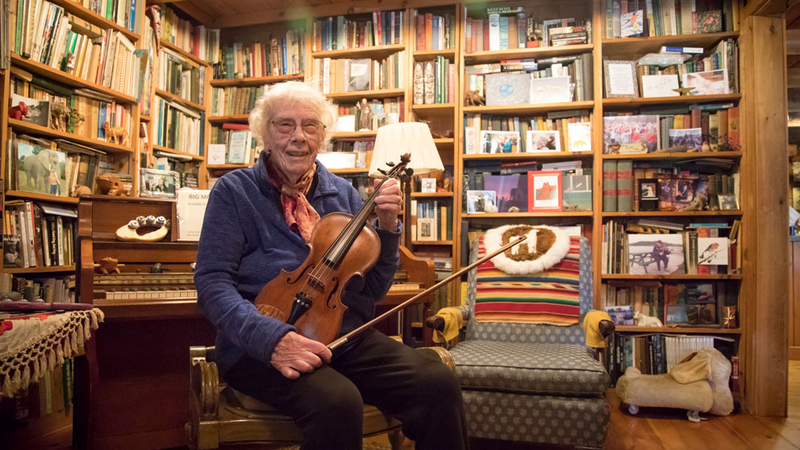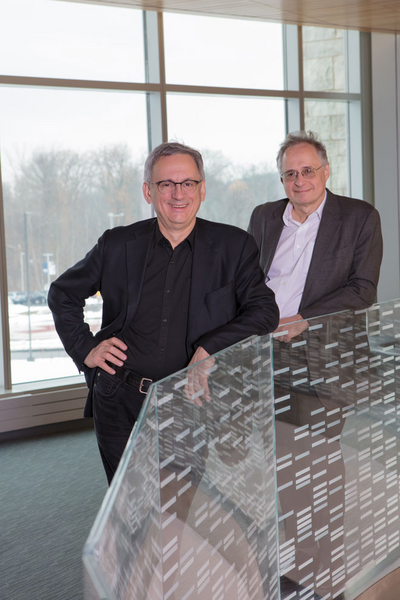Aging resiliently
The Search Magazine Article | December 20, 2017
Jacques Banchereau of The Jackson Laboratory and George Kuchel of UConn Health are working together to better understand the immune system changes that occur as a consequence of aging, and prolong the healthy lifespan of our elderly.
This morning, Ruth Grierson has filed her nature column in the local weekly newspaper and met a friend for a hike with her little dog, Sophie. She’s giving a fiddle lesson to an eight-year-old this afternoon, and after dinner she’s hosting a “porch party” of fellow musicians on the screened-in veranda of her comfortable log home on Maine’s Mount Desert Island.
Grierson turned 90 in December.
No one is interested in simply living longer if it's going to be at the cost of losing independence.
Historically, disease research has focused on what goes wrong in people who get sick. Researchers at The Jackson Laboratory are now exploring what goes right in healthy aging: What makes Grierson and other healthy older people thrive and avoid disease?
It’s a difficult truth to face as we grow older: The risk for heart disease, kidney failure and cancer rises with age; age is the single greatest risk factor for dementia and Alzheimer's disease; and infectious diseases like pneumococcal pneumonia, influenza andclostridium difficile are more lethal in older patients.
These diseases of aging, and not aging itself, keep millions of older Americans from enjoying Grierson’s kind of vital, active life. “When you talk to older adults,” says UConn Health gerontologist and aging researcher George Kuchel, M.D., “what you hear overwhelmingly is that no one wants to die, but also that no one is interested in simply living longer if it's going to be at the cost of losing independence, and at the cost of a poor quality of life.”
A major factor for increased susceptibility to disease in older people: The immune system declines with age. Kuchel and Jackson Laboratory (JAX) Professor and Director of Immunological Sciences Jacques Banchereau, Ph.D., have received funding from the National Institute on Aging to better understand the biological reasons for this decline.
You’d expect the researchers to study patients whose immune systems no longer effectively combat disease. Instead, they’re recruiting healthy older volunteers to figure out why some people maintain their immune arsenal well into their eighth, ninth or even tenth decade. This includes response to vaccines, which typically work less well in older people.
Kuchel and Banchereau are recruiting healthy older adults to receive one of two pneumococcal pneumonia vaccines free of charge, and collect blood samples at several time points and assess pneumococcal-specific antibody responses.


“Our hypothesis,” Banchereau says, “is that the altered immune responses of the elderly to pneumococcal vaccines are caused by genomic alterations associated with aging. These alterations result in dysfunction in immune cell types critical for adaptive immunity.”
Kuchel, who is also director of the Center on Aging at UConn Health, comments, “The concept of frailty has been at the core of geriatric medicine and gerontology. Basically, it’s trying to understand why some people are more vulnerable than others. But increasingly we’re looking at resiliency, to better understand why one individual is able to fend off an infection with no problem, while another gets the infection and winds up hospitalized.”
If the researchers can identify the genetic factors that contribute to resiliency to infection, these factors could be the basis for new treatments to boost flagging immune systems and response to vaccines.
A broader look at resilient aging was launched a decade ago at the Scripps Translational Research Institute in La Jolla, Calif. Researchers there sequenced the genomes of more than 1,400 exceptionally healthy Americans over the age of 80, and are tracking their incidence of the diseases of aging, such as cancer, heart disease and diabetes. Among the first findings of the“Wellderly” study: The participants have a higher-than-normal presence of genetic variants that appear to protect against cognitive decline.
For Grierson, it wouldn’t be hard to make a genetic case for her exceptional mental clarity and vitality, even without genomic sequencing. Both her parents were writers and musicians, and her father, a newspaper writer, lived to 98. “He wrote until he died,” Grierson says.
Grierson also ticks all the boxes for lifestyle factors associated with healthy aging, which include staying physically active, socially connected and mentally engaged.
Her cozy woodland house is lined floor-to-ceiling with books, her own paintings, musical instruments and photos from her travels around the world. Her early musical training was classical, but when she moved with her husband to Maine in 1972, she says, “I discovered this other kind of music,” bluegrass and traditional folk songs. “It’s great fun.” She picks up the violin she has had since the age of 12 and starts to play a haunting melody from the Civil War era.
Grierson was well in her 80s when she learned how to improvise. “When I went to college they didn’t teach us to improvise!” She and her friends get together to play music several times a week, either at each other’s houses or as in-demand performers at weddings, contra dances, public suppers and other celebrations, even open-mike nights at local bars and restaurants.
She is the mother of two and grandmother of three, but unlike many elderly people, her family is just a part of her lively social life.
Grierson walks or hikes every day with Sophie, often stopping to take photos of plants, one of her many interests. With a botanist friend she is working on her sixth book, this one about life at the edge of the sea.
In both her genes and lifestyle choices, Grierson seems to have ironclad defenses against age-related cognitive decline. JAX Assistant Professor Catherine Kaczorowski, Ph.D., is interested why some people with a family history of Alzheimer’s disease, and even brain changes associated with the disease, nevertheless manage to maintain their cognitive capabilities.
Kaczorowski explores the genetic factors behind this so-called cognitive resilience, which could someday provide targets for treatment and prevention of Alzheimer’s disease.
Several genetic mutations have been traced to a rare, early-onset type of Alzheimer’s disease that runs in families and appears in patients as young as 30 years old. With funding from the National Institute on Aging, Kaczorowski studies mice carrying these mutations to identify other genetic factors that may overcome the cognitive decline that usually comes with Alzheimer’s disease.
These resilience factors could point the way to new treatments that promote healthy brain aging and resistance to Alzheimer’s disease, including the more common, late-onset version of the disease for which there is no known genetic cause.
Gazing out over the wildlife pond near her house, Grierson comments, “You know, people give up too soon,” Grierson says. “In their fifties they start to say, ‘I’m getting old.’ You’re just beginning at 50!”
